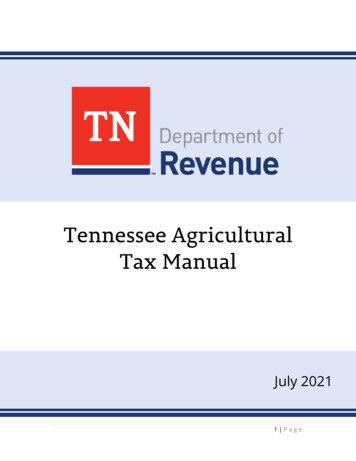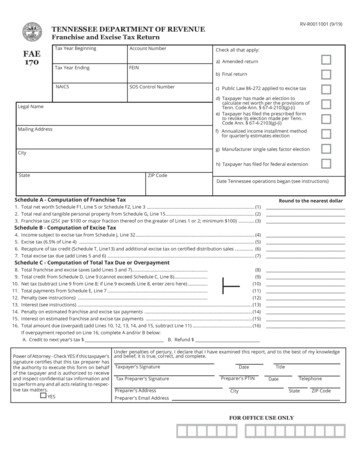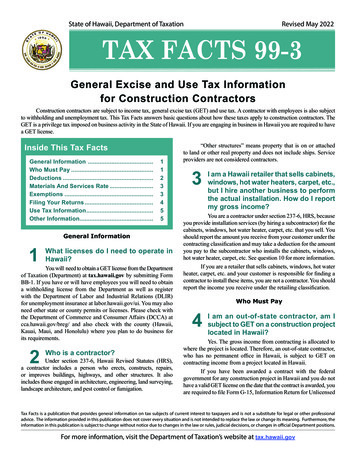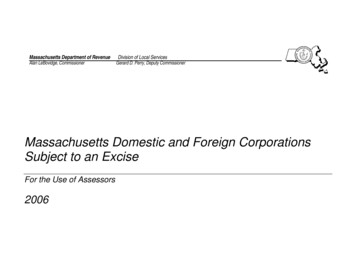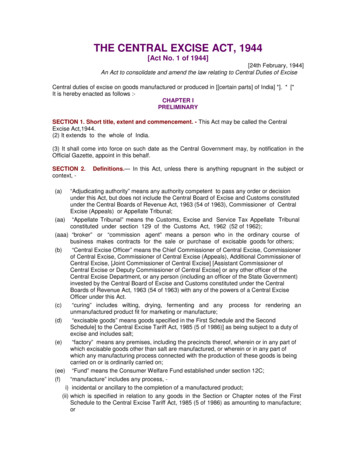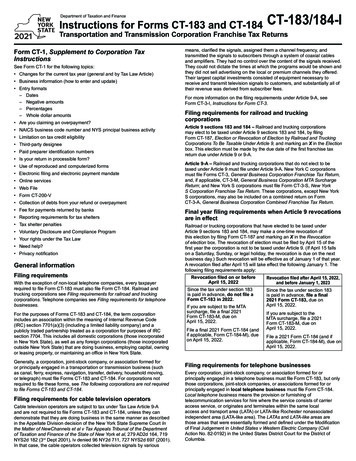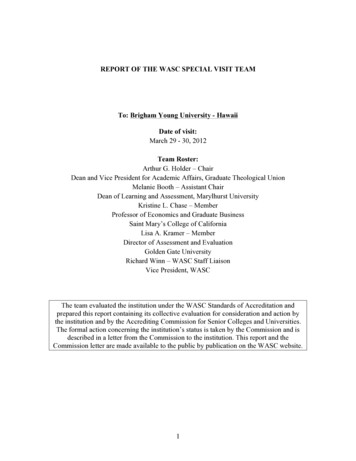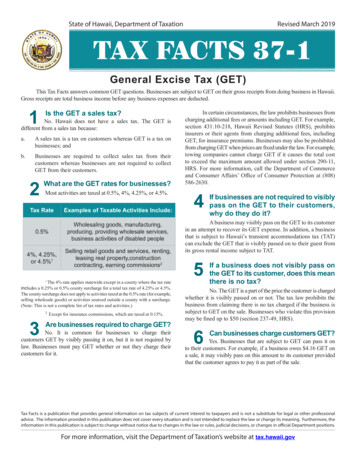
Transcription
State of Hawaii, Department of TaxationRevised March 2019TAX FACTS 37-1General Excise Tax (GET)This Tax Facts answers common GET questions. Businesses are subject to GET on their gross receipts from doing business in Hawaii.Gross receipts are total business income before any business expenses are deducted.1Is the GET a sales tax?No. Hawaii does not have a sales tax. The GET isdifferent from a sales tax because:a.A sales tax is a tax on customers whereas GET is a tax onbusinesses; andb.Businesses are required to collect sales tax from theircustomers whereas businesses are not required to collectGET from their customers.2What are the GET rates for businesses?Most activities are taxed at 0.5%, 4%, 4.25%, or 4.5%.Tax RateExamples of Taxable Activities Include:0.5%Wholesaling goods, manufacturing,producing, providing wholesale services,business activities of disabled people4%, 4.25%,or 4.5%1Selling retail goods and services, renting,leasing real property,constructioncontracting, earning commissions2The 4% rate applies statewide except in a county where the tax rateincludes a 0.25% or 0.5% county surcharge for a total tax rate of 4.25% or 4.5%.The county surcharge does not apply to activities taxed at the 0.5% rate (for example,selling wholesale goods) or activities sourced outside a county with a surcharge.(Note: This is not a complete list of tax rates and activities.)123Except for insurance commissions, which are taxed at 0.15%.Are businesses required to charge GET?No. It is common for businesses to charge theircustomers GET by visibly passing it on, but it is not required bylaw. Businesses must pay GET whether or not they charge theircustomers for it.In certain circumstances, the law prohibits businesses fromcharging additional fees or amounts including GET. For example,section 431:10-218, Hawaii Revised Statutes (HRS), prohibitsinsurers or their agents from charging additional fees, includingGET, for insurance premiums. Businesses may also be prohibitedfrom charging GET when prices are fixed under the law. For example,towing companies cannot charge GET if it causes the total costto exceed the maximum amount allowed under section 290-11,HRS. For more information, call the Department of Commerceand Consumer Affairs’ Office of Consumer Protection at (808)586‑2630.4If businesses are not required to visiblypass on the GET to their customers,why do they do it?A business may visibly pass on the GET to its customerin an attempt to recover its GET expense. In addition, a businessthat is subject to Hawaii’s transient accommodations tax (TAT)can exclude the GET that is visibly passed on to their guest fromits gross rental income subject to TAT.5If a business does not visibly pass onthe GET to its customer, does this meanthere is no tax?No. The GET is a part of the price the customer is chargedwhether it is visibly passed on or not. The tax law prohibits thebusiness from claiming there is no tax charged if the business issubject to GET on the sale. Businesses who violate this provisionmay be fined up to 50 (section 237-49, HRS).6Can businesses charge customers GET?Yes. Businesses that are subject to GET can pass it onto their customers. For example, if a business owes 4.16 GET ona sale, it may visibly pass on this amount to its customer providedthat the customer agrees to pay it as part of the sale.Tax Facts is a publication that provides general information on tax subjects of current interest to taxpayers and is not a substitute for legal or other professionaladvice. The information provided in this publication does not cover every situation and is not intended to replace the law or change its meaning. Furthermore, theinformation in this publication is subject to change without notice due to changes in the law or rules, judicial decisions, or changes in official Department positions.For more information, visit the Department of Taxation’s website at tax.hawaii.gov
Tax Facts 37-1Revised March 2019How much can businesses charge theircustomers?7For example, if the sales price is 100:Business’sGET rate:Maximum rate Maximum GETit can charge: it can charge:TotalPrice:4%4.166%3 4.16 104.164.25%4.4386%3 4.43 104.434.5%4.712% 4.71 104.713The maximum rate is greater than the tax rate because businessesare taxed on their gross receipts including GET that is charged to customers. Thisrate allows businesses to cover their entire GET expense.38Can businesses charge more than themaximum rates?9Do businesses have to tell theircustomers if they plan to visibly passon GET?No. Consumer protection laws prohibit businesses fromcharging customers more GET than the business will pay on thetransaction. The Office of Consumer Protection will take immediateaction against businesses that charge more tax than what is actuallydue. For more information, call the Office of Consumer Protectionat (808) 586‑2630.Yes. Businesses must tell their customers if they plan tovisibly pass on GET and customers must agree to pay it becausemisrepresenting the actual price violates consumer protection laws.For example, if a customer requests a quote for an item that sellsfor 104.71, businesses should quote one of the following:a. Sales price plus GET rateb. Sales price plus GET amountc. Total price including GET 100 plus 4.712%4 GET 100 plus 4.715 GET 104.716(44.166% for the Maui county or 4.4386% for the Hawaii county.)(5 4.16 for the Maui county or 4.43 for the Hawaii county.)(6 104.16 for the Maui county or 104.43 for the Hawaii county.)Page 210If a wholesaler sells an item to a retailerwho then sells that same item to me,isn’t that double taxation?No. Double taxation occurs when the same salestransaction is taxed twice. In this situation, there are two salestransactions and each is separately taxed. The wholesaler is taxedat 0.5% on its sale to the retailer. The retailer is taxed at 4% (plusthe county surcharge if applicable) on its sale to you.11Can businesses charg e GET t otax‑exempt organizations such asnonprofits, government agencies, andcredit unions?Yes. Sales to tax-exempt customers are generally subjectto GET. There are no GET exemptions based on a customer’stax-exempt status. As a result, we do not issue tax exemptioncertificates to tax-exempt organizations, government agencies, orcredit unions to exempt their purchases from Hawaii businesses.Many nonprofit and religious organizations like universitiesand churches are exempt from federal and state income taxes, butsince the GET is imposed on businesses and not customers, sales tothese organizations are subject to GET. Therefore, a business maycharge GET to a tax‑exempt organization when the organizationmakes purchases from the business. Similarly, sales to (federal,state, and county) government agencies including the military andcredit unions are also generally taxable; however, if a businesssells goods to the federal government or a credit union, the saleis exempt and the business may claim a deduction (see the GETreturn instructions for more information).12Are nonresidents exempt from payingthe GET on goods purchased in Hawaii?There is no GET exemption for goods sold in Hawaiito nonresidents. We do not issue tax exemption certificates totourists or other nonresidents to exempt their purchases from Hawaiibusinesses. However, if the Hawaii business ships the goods directlyto the customer’s out-of-state residence, then the sale is exemptand the business may claim a deduction. If the customer takesdelivery of the goods in Hawaii and then ships the goods outof-state, the sale is subject to GET. See Tax Information ReleaseNo. 98-5, “General Excise Tax Exemption for Tangible PersonalProperty, Including Souvenirs and Gift Items, Shipped out of theState,” and Form G-61, “Export Exemption Certificate for GeneralExcise and Liquor Taxes,” for more information.Where to Get Forms and InformationWebsite: tax.hawaii.govTelephone: 808-587-4242Toll-Free: 1-800-222-3229Telephone for the hearing impaired: 808-587-1418Toll-Free: 1-800-887-8974Tax Facts is a publication that provides general information on tax subjects of current interest to taxpayers and is not a substitute for legal or other professionaladvice. The information provided in this publication does not cover every situation and is not intended to replace the law or change its meaning. Furthermore, theinformation in this publication is subject to change without notice due to changes in the law or rules, judicial decisions, or changes in official Department positions.For more information, visit the Department of Taxation’s website at tax.hawaii.gov
State of Hawaii, Department of TaxationRevised June 2016TAX FACTS 98-3Tax Information for Nonprofit OrganizationsThis Tax Facts answers commonly asked questions about nonprofit organizations.1Is our nonprofit organization tax-exempt?2How do we apply for tax‑exempt statusunder Hawaii tax laws?You can be a nonprofit organization, but that doesnot automatically make you tax-exempt. To be tax-exempt, youmust meet certain requirements. For more information, see federalPublication 557, “Tax-Exempt Status for Your Organization.”Income TaxYou do not need to apply with us to be exempt from Hawaiiincome tax. Certain organizations (see table below for a samplelisting) that are exempt from federal income tax are automaticallyexempt from Hawaii income tax. No separate Hawaii application isrequired. Most organizations are required to apply with the InternalRevenue Service (IRS) to receive tax-exempt status. For informationon this process, see federal Publication 557.Internal Revenue 1(c)(7)501(c)(8)501(c)(12)General Description of theOrganizationReligious, charitable, scientific,oreducationalCivic leagues, social welfareLabor, agricultural, horticulturalBusiness leaguesSocial and recreational clubsFraternal beneficiary societiesPotable water companiesGeneral Excise Tax (GET)You must apply with us to be exempt from GET. See question7 for information on applying for an exemption from GET.3We are recognized as tax‑exempt by theIRS. When is our state income taxexemption effective?4What if the IRS revokes our income taxexemption?5We are recognized as tax-exempt by theIRS. What are my reporting requirementsfor Hawaii income tax purposes?If the IRS revokes your exemption, your Hawaii income taxexemption will also be revoked on the effective date of the IRSrevocation.Although you may be required to file a Form 990 or 990‑EZwith the IRS, you are not required to file any correspondinginformation return for Hawaii income tax purposes. If you arerequired to file Form 990-T with the IRS, you are required to fileForm N-70NP for Hawaii income tax purposes on the unrelatedbusiness income. Private foundations are required to file a copy oftheir federal filings with the Attorney General. Federal Publication557 discusses the filing requirements and required disclosures ofnonprofit organizations for federal income tax purposes.Effective January 1, 2009, organizations that solicitcontributions are required to register with the Hawaii AttorneyGeneral unless exempted from the registration requirement. Pleasevisit their website at ag.hawaii.gov for more information.6The IRS stated that we must file Form990-T for unrelated business income.What type of income is this and do wehave to file a return with Hawaii?The IRS has issued guidelines about unrelated business incomein federal Publication 598, “Tax on Unrelated Business Income ofExempt Organizations.” Hawaii follows the federal determinationof unrelated business income for Hawaii income tax purposes. Ingeneral, unrelated business income is from a sales activity that doesnot further the organization’s exempt purpose. If you are requiredto file Form 990-T with the IRS, you must file Form N-70NP forHawaii income tax purposes.The effective date for the exemption from Hawaii income taxis the same as the effective date for federal purposes.Tax Facts is a publication that provides general information on tax subjects of current interest to taxpayers and is not a substitute for legal or other professionaladvice. The information provided in this publication does not cover every situation and is not intended to replace the law or change its meaning. Furthermore, theinformation in this publication is subject to change without notice due to changes in the law or rules, judicial decisions, or changes in official Department positions.For more information, visit the Department of Taxation’s website at tax.hawaii.gov
Tax Facts 98-3Revised June 20167If we are tax‑exempt for income taxpurposes, are we also exempt frompaying GET?Not necessarily. Under the GET Law, organizations createdfor the purposes listed in sections 237-23(a)(3) through (7), HawaiiRevised Statutes (HRS), may be exempt from GET, but must applyfor an exemption. Use Form G-6, Application for Exemption fromGeneral Excise Taxes, or Form G-6S, Application for Exemptionfrom General Excise Taxes (Short Form), to apply for an exemptionfrom GET. A one‑time 20 registration fee must be paid with FormG‑6 or G-6S. If you already paid the 20 fee to get a GET license,you do not need to submit the 20 registration fee — just fill inyour GET number on Form G‑6 or G-6S in the space provided.See the Instructions for Form G‑6 and G-6S for more informationon applying for a GET exemption.8We filed Form G‑6 and received a letterapproving the GET exemption for ourorganization. When is our exemptioneffective?Under the GET Law, Form G-6 or G-6S must be filed withinthree months from the start of business. If Form G-6 or G-6S is filedwithin three months, the exemption applies to income earned fromthe start of business. If the application is filed after three months,the exemption applies only to income received after Form G-6or G-6S was filed. Once the exemption is approved, no furtherapplication is necessary unless there is a material change in yourobjectives or operations.9If granted the exemption, is all the incomewe receive exempt from GET?It depends. Amounts received as dues, donations, or giftsare not included in gross income subject to GET. However, grossreceipts from any activity in which the primary purpose is to produceincome is subject to GET, even if used to fund your exempt purposes.Gross income received from any fundraising activity is subject toGET. Other income may be exempt from GET depending on ifthe activity is related to your exempt purpose (see question 10).10What types of activities are considered“fundraising activities”?In general, “fundraising activities” are activities conductedwith the intention of generating income. Fundraising activities alsoinclude activities that fulfill the organization’s exempt function ifthe activities’ primary purpose is to generate income. The activitydoes not have to be profitable to be taxable and includes incomePage 2from a one-time event. Do not confuse this with “unrelated businessincome” as defined for income tax purposes.Although casual sales are exempt from GET, this exemption isnot applicable to fundraisers. A fundraising activity is not a “casualsale” since the activity is not a single occasional sale or an incidentalsale. It is an infrequent activity comprised of numerous sales ortransactions. For example, white elephant sales, fairs, and bazaars. Itdoes not matter that the items sold were donated to the organization.Example: An educational institution’s exempt purpose is “toeducate students in an environment conducive to learning.” Theinstitution charges tuition to attend the institution and also sellslearning materials. Occasionally, the institution has a fair and sellsbaked goods or other merchandise to raise funds for the institutionto operate.The gross income from the tuition and sale of learning materialsis exempt from GET since it is related to the organization’s exemptpurpose. The gross income from the fair and sales of merchandise,however, is taxable for GET. Even if the income received will be usedto further the organization’s exempt purpose, it is subject to GET.11If we are registered as tax-exempt underthe GET Law, are we also exempt frompaying the GET when we buy goods andservices?No. Because the GET is imposed on the seller and not onthe customer (for example, the nonprofit organization), sellers aresubject to the GET on their income from selling goods and servicesto you. Sellers are not tax-exempt even if their customers are.Therefore, a seller may visibly pass on their GET to you whenyou buy goods and services. The pass on of the GET is a matter ofcontract between the seller and you.12Our organization rents out facilities weown to other nonprofits, members, andthe general public. Are these rentssubject to GET?Yes. In general, when an organization rents its facilities toothers, it is considered to be engaging in a business activity even ifthe rent may be a cost recovery amount. Some organizations whoseexempt purpose is to provide facilities to the underprivileged or otherexempt organizations may not be subject to GET if they are properlyregistered with the Department. See question 7.13What qualifies as a donation and whyaren’t donations subject to GET?A donation is a gift which is voluntarily given withoutcompensation or any expectation of receiving something in return.Tax Facts is a publication that provides general information on tax subjects of current interest to taxpayers and is not a substitute for legal or other professionaladvice. The information provided in this publication does not cover every situation and is not intended to replace the law or change its meaning. Furthermore, theinformation in this publication is subject to change without notice due to changes in the law or rules, judicial decisions, or changes in official Department positions.For more information, visit the Department of Taxation’s website at tax.hawaii.gov
Tax Facts 98-3Revised June 2016Page 3Under the GET Law, there is an exemption for the value of allproperty that is received by gift, bequest, or inheritance. If a donorpurchases a ticket (for example, a dinner, concert, or bowl of chili),the ticket sale is not a donation because something of value is beingreceived for the donation. This is true even if the donor does notredeem the ticket. Whether something is a true donation dependson the circumstances of the activity involved and not the namegiven to the transaction. For example, if an organization offers theuse of its facilities in exchange for a “donation,” the receipt willbe treated as rental income subject to GET.14We received income from a benefitdinner. Why are we taxable on the grossamount and not the cost of the dinner?The rules for determining the amount of the contributiondeductible for income tax purposes and the amount subject to GET aredifferent. For income tax purposes, federal rules permit under somecircumstances the subtraction of the value of the goods or servicesprovided by the nonprofit organization from the total contributionto determine the deductible portion of the contribution. The GET,as a gross receipts tax, does not allow for such deductions to reducethe gross receipts subject to GET, even if a portion of the ticketprice is considered a “donation.”15If we sell items and services which aredonated to us, are the amounts receivedtaxable for GET?Yes. The sale (including sales by auction) by a nonprofitorganization of donated items is an activity in which the primarypurpose is to produce income. Therefore, the gross proceeds derivedfrom the activity are subject to GET. For more information, see TaxInformation Release (TIR) No. 91-2, “Taxability of Gross ProceedsReceived by a Nonprofit Organization From the Sale of DonatedServices or Tangible Personal Property.”16Does an activity have to be “profitable”in order for it to be subject to GET?No. See questions 10 and 14.17We receive interest income from ourbank accounts. Is this subject to GET?18If we are registered as an exemptorganization under the GET Law, are wealso exempt from paying the use tax?Under the GET Law, the gross income subject to GET includesall receipts, actual or accrued, by investment of the capital of thebusiness engaged in, including interest. Contributions, donations,dues, and income from the organization’s exempt purpose that aredeposited in the bank, are not considered “investment of the capitalof the business engaged in.” A nonprofit organization is not createdfor the purpose of making profits and the primary purpose fordepositing the money in the bank is for safekeeping and, therefore,not subject to GET. However, interest earned from funds from anunrelated trade or business activity is subject to GET. See question6. For more information, see TIR No. 42-74, “Application of theGeneral Excise Tax to Interest Income.”No. Although the GET Law exempts certain nonprofitorganizations who have registered for a GET exemption, the UseTax Law does not provide a complementary exemption. The usetax is a complementary tax to the GET. The use tax is imposed ontangible personal property, services, or contracting imported foruse in Hawaii and acquired from a seller located outside of thestate who is not subject to GET. For more information on the usetax, see Tax Facts 95-1, “Use Tax.”19Where can we get additional informationon how to start a nonprofit organization?For information on how to organize your nonprofit organizationunder Hawaii’s Nonprofit Corporation Act (Chapter 414D, HRS),contact the Business Registration Division of the Department ofCommerce and Consumer Affairs at 808-586-2727.There also is a nonprofit organization which has an assistanceprogram to help individuals set up a nonprofit organization. Contactthe Hawaii Alliance of Nonprofit Organizations, 1020 SouthBeretania St., 2nd Floor, Honolulu, Hawaii 96814 or call them at808-529-0466.Where to Get Forms and InformationWebsite: tax.hawaii.govTelephone: 808-587-4242Toll-Free: 1-800-222-3229Telephone for the hearing impaired: 808-587-1418Toll-Free for the hearing impaired: 1-800-887-8974Tax Facts is a publication that provides general information on tax subjects of current interest to taxpayers and is not a substitute for legal or other professionaladvice. The information provided in this publication does not cover every situation and is not intended to replace the law or change its meaning. Furthermore, theinformation in this publication is subject to change without notice due to changes in the law or rules, judicial decisions, or changes in official Department positions.For more information, visit the Department of Taxation’s website at tax.hawaii.gov
Religious, charitable, scientific,or educational 501(c)(4) Civic leagues, social welfare 501(c)(5) Labor, agricultural, horticultural 501(c)(6) Business leagues 501(c)(7) Social and recreational clubs 501(c)(8) Fraternal beneficiary societies 501(c)(12) Potable water companies General Excise Tax (GET) You must apply with us to be exempt from GET.
